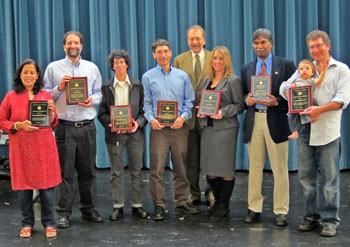Campus News
Recognizing excellence in teaching at UCSC
The 2011-12 Excellence in Teaching Awards honored eight caring professors who inspired their students at UCSC. UCSC Chancellor George Blumenthal presented the awards at the Stevenson Event Center on campus.

Eight faculty members from UC Santa Cruz received the 2011-12 Excellence in Teaching Awards during a campus ceremony on Friday, May 18. Given each spring by the Academic Senate’s Committee on Teaching, the awards honor UCSC instructors who have demonstrated exemplary and inspiring teaching.
Nominations are submitted by students. The senate committee also reads a statement on teaching written by the nominee, as well as a letter from the department chair. The committee looks for evidence that the nominee has thought deeply about teaching and learning, and effectively applies that thinking in the classroom.
This year’s awards were presented by UCSC Chancellor George Blumenthal at the Stevenson Event Center on campus. Most of the teaching awards include a prize of $500, with the exception of the Ron Ruby Award for Teaching Excellence in the Physical and Biological Sciences, which includes a $750 prize.
The winners, with excerpts from the student nominations:
Andrew Fisher, earth & planetary sciences, “for being friendly, caring and approachable, making even the least intuitive concepts understandable, lecturing with great clarity and going out of his way to support student learning outside the classroom, and caring about the success of his students. His sense of humor keeps difficult material interesting. One student was inspired to change majors after taking his lower-division geology class.”
Bakthan Singaram, chemistry and biochemistry, who is receiving the Ron Ruby Award for Teaching Excellence in the Physical and Biological Sciences, “for making organic chemistry enjoyable, applying class material to everyday life, using excellent communication skills, holding office hours four days a week, and inspiring students to do their best.”
Deborah Gould, sociology, “for inspiring students to get involved and make the world a better place, encouraging them to look toward the future and offer solutions. Her ‘no Powerpoint’ policy creates an environment for great discussion and critical thinking. She encourages everyone to participate. Many of her lectures receive a round of applause.”
Gabriel Elkaim, computer engineering, “for his passionate engagement with computer robotics. He pushes his students to learn the material and complete their projects, and while he expects ‘an absurd amount of hours,’ he puts in the hours with his students and stays late. Several mentioned an impromptu lecture he gave after midnight on a Friday when, after checking in on a lab, he realized students needed help understanding the material. He doesn’t just teach; he lives and breathes his work.”
Lora Bartlett, education, “for teaching with a fiery passion, reminding students why they want to be educators with her engaging style. She has also been described as an inspiring for undergraduate and graduate-division scholars. One student called her ‘the most influential professor I’ve ever had’ while a doctoral student said her Qualitative Research Methods course will be invaluable during the dissertation phase.”
Nandini Bhattacharya, mathematics, “for being helpful, straightforward, fair, caring, approachable and understanding. One student said her class is all you could ever ask for in a math class. This masterful lecturer prepares students to continue in mathematics. She even makes students laugh – no easy feat in an 8 a.m. class.”
Paul Nauert, music, “for his profound understanding of the course material, and for being thorough, caring, patient, enthusiastic and practical. Inspired by his optimism, kind-heartedness and refreshing sense of humor, students call attention to his clear, detailed, well-structured lectures.”
Steven Ritz, physics, “for setting the ‘gold standard’ for physics education with his caring, approachable style, his responsiveness to student questions, his willingness to set up additional small group meetings to talks with students, and his ability to make ‘mind-boggling’ ideas understandable, while connecting them seamlessly to equations. He also makes lectures relevant to real life.”